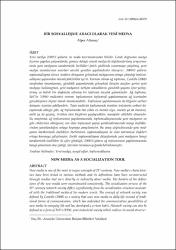| dc.contributor.author | Altunay, Alper D. | |
| dc.date.accessioned | 2019-10-21T19:43:13Z | |
| dc.date.available | 2019-10-21T19:43:13Z | |
| dc.date.issued | 2015 | |
| dc.identifier.issn | 2148-2942 | |
| dc.identifier.uri | http://www.trdizin.gov.tr/publication/paper/detail/TVRrMU9EZ3dNQT09 | |
| dc.identifier.uri | https://hdl.handle.net/11421/19434 | |
| dc.description.abstract | Yeni medya 2000'li yılların en moda kavramlarından biridir. Gerek doğrudan medya üzerine yapılan çalışmalarda, gerekse dolaylı olarak medya ile ilişkilendirilmiş araştırmalarda yeni medyanın karakteristik özellikleri farklı şekillerde sınanmaya çalışılmış, yeni medya tanımlarının sınırları sürekli yeniden yapılandırılır olmuştur. 2000'li yılların toplumsallaşma süreci, modern dünyanın geleneksel medyasının ortaya çıkardığı toplumsallaşma yapısından önemli farklılıklar içerir. Kavram olarak ağ toplumu, Castells (2008) tarafından tanımlanmış, gündelik yaşamlarında geleneksel iletişim araçları yerine yeni medyayı kullanagelen, yeni medyanın iletişim olanaklarını gündelik yaşamı içine yerleştirmiş ve belirli bir alışkanlık edinmiş bir topluma karşılık gelmektedir. Ağ toplumu, Bell'in (1996) endüstrisi sonrası toplumunun toplumsal yapılanmasını ağ üzerinden gerçekleştiren biçimi olarak tanımlanabilir. Toplumsal yapılanmasını da bilginin serbest dolaşımı üzerine şekillendirir. Tıpkı endüstri toplumunda üretilen ürünlerin serbest dolaşımında olduğu gibi, ağ toplumunda öne çıkan en önemli olgu, önemli ya da önemsiz, anlık ya da geçmiş, üretilen tüm bilgilerin paylaşılabilir, manipüle edilebilir olmasıdır. Bu araştırma, ağ toplumunun yapılanmasında, toplumsallaşmasında yeni medyanın ne gibi etkilerinin olduğunu; var olan toplumsal yapıyı şekillendirmesinde hangi özelliklerinden yararlandığını ortaya koymayı amaçlamıştır. Bu amaç doğrultusunda yeni medyanın karakteristik özellikleri özetlenerek, toplumsallaşma ile olan kavramsal ilişkileri ortaya konmaya çalışılmıştır. Farklı toplumsallaşma düzeylerinde yeni medyanın hangi karakteristik özellikleri ile işlev gördüğü, 2000'li yıların ağ toplumunun yapılanmasında hangi yönlerinin öne çıktığı, literatür taraması ışığında betimlenmiştir | en_US |
| dc.description.abstract | New media is one of the most in vogue concepts of 21st century. New media's characteristics have been tested in various methods and its definitions have been reconstructed through studies that were directly or indirectly about media. The borders of the definitions of the new media were reconstructed consistently. The socialization process of the 21st century network society differs significantly from the socialization structure associated with the traditional media of the modern world. The concept of network society was defined by Castells (2008) as a society that uses new media in daily life instead of traditional forms of communication, which has embedded the communication possibilities of new media to everyday life and has developed a certain habit. Network society can also be defined as a form of Bell's (1996) post-industrial society which realizes its social structuring through a network. While Bell signifies the generation and circulation of knowledge in his definition of the post-industrial society; in Castell's network society the social structuring processes and the circulation of knowledge is achieved over the network. For this reason, network society is an information society rather than an industrial one. It shapes its social structure around the free circulation of knowledge. Just like the free movement of the post-industrial society products, the most prominent phenomena of the network society is that any information can be distributed and manipulated regardless of significance or time of relevance. This study aims to determine the effects of new media in the structuring and social shaping of the network society, and to determine which of its qualities are utilized in shaping social structure. In accordance with this goal, the characteristics of new media have been summarized and the conceptual relationships between these characteristics and social structuring are portrayed. The determination of which characteristics of new media are functional in different levels of social structure and the aspects of which stand out in the structuring of the network society of the 2000s is portrayed through the literature review. | en_US |
| dc.language.iso | tur | en_US |
| dc.rights | info:eu-repo/semantics/openAccess | en_US |
| dc.subject | İletişim | en_US |
| dc.title | Bir Sosyalleşme Aracı Olarak Yeni Medya | en_US |
| dc.title.alternative | New Media as a Socialization Tool | en_US |
| dc.type | article | en_US |
| dc.relation.journal | Selçuk İletişim | en_US |
| dc.contributor.department | Anadolu Üniversitesi, İletişim Bilimleri Fakültesi | en_US |
| dc.identifier.volume | 9 | en_US |
| dc.identifier.issue | 1 | en_US |
| dc.identifier.startpage | 410 | en_US |
| dc.identifier.endpage | 428 | en_US |
| dc.relation.publicationcategory | Makale - Ulusal Hakemli Dergi - Kurum Öğretim Elemanı | en_US] |


















